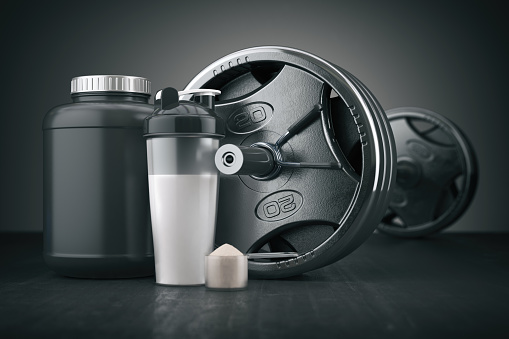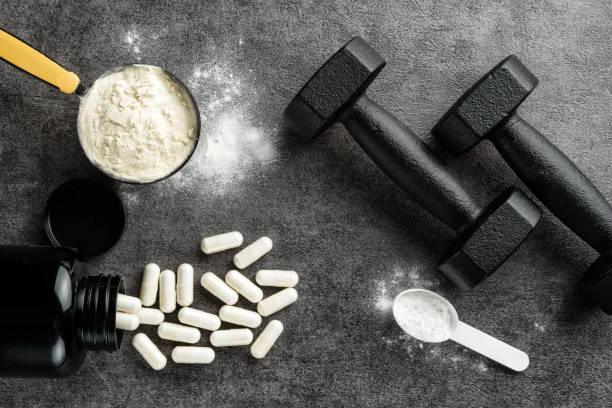If you’re into big lifts and exercise, creatine can be an easy supplement for you to add to your workout. It’s a form of high-intensity energy booster that works by increasing the production of ATP, which essentially gives your body a faster, better way of recovering post-workout. I work at SPIbelt in Chicago and I often ask my customers about their supplement use so it seemed like a natural fit that this blog article would be about creatine and other common performance supplements!
Generally speaking, it takes about two weeks for the majority of people to clear their systems of creatine. That being said, everyone is different and there are some people who might take longer than that. Also, keep in mind that this is only a general guideline – if you’re actively recovering from an injury or surgery, your clearance time could be significantly longer.
Creatine is an amino acid used to help make your muscles stronger, but just how long does it stay in your system? With this blog article I will explain the science behind creatine and more.
Why Are Creatine Supplements Used?
Creatine is a natural supplement that has been shown to increase energy and strength in athletes. It has also been seen as a potential treatment for various health conditions, including Parkinson’s disease, heart failure, and memory loss. However, how long does it take for creatine to clear out of your system? In most cases, it takes about four days for the majority of creatine to leave your body.
Some people may want to take creatine supplements to increase their muscle mass, strength, or Stamina. For the most part, creatine supplementation is safe and well-tolerated. However, like any other supplement, it is important to speak with your doctor before starting a creatine supplement regimen if you are taking any medications or have certain medical conditions.
What Is It Made Of Supplements ?
Creatine is a molecule that is found naturally in the body, and it’s most commonly used for energy production. When taken as a supplement, creatine can help improve muscular endurance and strength. People who take creatine typically take it for approximately four to six weeks before they start to see results.
When you first start taking creatine, your body will start to break down the muscle tissue in your liver so that the creatin can be absorbed into your bloodstream. The average time it takes to clear out of your system from creatine is two to four days. However, some people may experience longer or shorter times depending on their individual metabolism.

Creatine is typically made from three ingredients: water, creatine, and salt.
How Does It Work?
Creatine is naturally found in the body and is used by muscles to create energy. When creatine is taken as a supplement, it helps to increase muscle strength, mass, and endurance by helping to create more energy. Creatine can take up to three days to clear out of the system.
Creatine is a substance that has been shown to help increase strength, power and endurance in athletes. Recent studies also suggest that creatine can improve brain health and might help prevent some types of Neurological diseases. Creatine is taken orally and it is mostly stored in the muscle cells. It takes about 3-5 days for creatine to clear out of the body.
The Science Behind Creatine Supplementation
Creatine is a naturally occurring amino acid that is commonly found in meat and fish. It is most commonly known for its ability to increase muscular strength, length and power. Creatine has been shown to help improve performance during various physical activities, including running, swimming and weightlifting.
When creatine is supplemented, it enters the blood stream and travels to the muscles where it helps produce energy. The time it takes for the body to clear creatine depends on a number of factors, including weight, intensity of exercise and if other drugs are also being taken that could affect creatinine clearance. Generally speaking, it takes about two weeks for creatine levels to drop below normal levels in the blood.
There are a number of potential side effects associated with creatine supplementation, including stomach pain, diarrhea and weight gain. While these risks are generally mild, it’s important to talk to your doctor before starting a creatine supplement regimen.

What are the Side Effects of Creatine?
Creatine is a natural supplement that is often used by athletes to increase strength and power. The side effects of creatine can depend on a person’s body composition and muscle loading, but can generally be divided into acute (short-term) and chronic (long-term) side effects. Acute side effects can include an increase in body water, an elevation in blood pressure, and diarrhea. Chronic side effects can include muscle pain, weakness, fatigue, kidney damage, and psychiatric problems.
There are also some potential safety concerns with creatine supplementation. It is possible to experience serious liver toxicity from high doses of creatine, and some people have experienced a serious muscle infection called Creatine Kinase Myopathy after taking creatine.
How Long Does Creatine Leave Your System
Creatine is a molecule that is found in both animal and plant tissues. When creatine is supplemented, it enters the bloodstream and is transported to muscle cells where it helps create energy for exercise. Creatine can remain in the body for several days after supplementation has ended.
Creatine can be eliminated through the urine, feces, and sweating. The majority of creatine is eliminated in the first few days after supplementation is stopped, but some may remain for up to several weeks.

The Best Ways to Cycle Creatine for Best Results on Bodybuilding
Creatine is one of the most commonly used supplements in bodybuilding and fitness. People use creatine to increase muscle mass, strength, and performance. However, many people don’t know how long it takes for creatine to clear out of your system.
Creatine can be safely used for up to 72 hours after taking it. Muscle cells can absorb creatine quickly and easily if it’s been properly absorbed by your gut. The average time it takes for creatine to clear from the body is about three days. Taking creatine regularly over an extended period will help keep your muscles build more muscle tissue and improve performance.
Types of Creatine Products
Creatine is a molecule that helps to form the energy needed for muscle contractions. When taken as part of a supplementation plan, it has been found to Delay muscle soreness and promote faster recovery times after strenuous activity.
There are many types of creatine products on the market, but all of them generally fall into one of two categories: simple creatine supplements or complex Creatine blends.

Simple Creatine Supplements: These supplements simply contain creatine monohydrate, without any additional ingredients. They are usually the cheapest option available and suitable for most people. However, due to their simplicity, they may not offer the best possible mix of performance and safety benefits.
Complex Creatine Blends: These supplements often combine multiple forms of creatine (monohydrate, citrate, malate) to increase performance and improve safety. They also tend to be more expensive than simple Creatine supplements but may offer wider range of benefits.
There are a few different types of creatine supplements on the market, each with its own particular benefits. The three most popular types are creatine monohydrate, creatine hydrochloride, and creatine ethyl ester. Here’s a look at their respective properties:
Creatine Monohydrate is the predominant form found in supplements. It’s a powder that’s mainly composed of water, magnesium, and creatinine. Creatine monohydrate is fairly cheap and easy to find, making it a good choice for those who don’t want to take time to research other options.
Creatine Hydrochloride is created when creatine monohydrate is combined with hydrochloric acid. This compound has a higher concentration of creatinine than creatine monohydrate and provides more rapid results when taken orally. Hydrochloric acid can also damage cells in the stomach, so be sure to follow the manufacturer’s instructions carefully when taking this type of supplement.
Creatine Ethyl Ester is another variation on the theme of creatinine-rich supplements. It’s an esterified version of creatinine that dissolves more easily in water than either creatinine monohydrate or hydrochloride. This makes it more suitable for use in conjunction with other athletic activities such as swimming or cycling because it doesn’t leave behindickey aftertaste like some forms of creatine do.
Pros of Using Creatine:
- It can help improve strength and power.
- It can help reduce the risk of experiencing muscle cramps and soreness.
- It can help increase the speed of recovery after strenuous activity.
- It can improve performance in endurance sports.
- It can promote fat loss and invigorate the musculature.
Cons of using Creatine:
- It can also cause dehydration and fatigue.
- It may not be compatible with certain medications.
- There is some risk of developing a heart condition if creatine is taken in high doses.
- It may not be suitable for everyone, particularly those with kidney problems.
- It is important to consult with a healthcare professional before starting a creatine regimen.
Conclusion
After taking creatine, it is important to know how long it will take for you to feel its effects.Creatine can cause muscle fatigue and a decrease in strength, so you will want to allow time for your body to adjust before doing more strenuous activity. The average person should expect to feel the effects of creatine within two hours and should not perform any vigorous exercise while taking the supplement.








